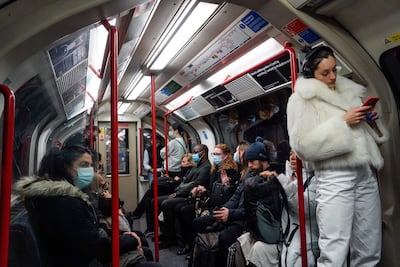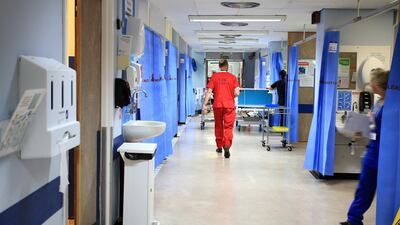UK government ministers are coming under mounting pressure to implement “Plan B” winter measures to address rising Covid-19 cases and a faltering booster vaccine programme.
The head of the NHS Confederation, which represents the healthcare provider in England, Wales and Northern Ireland, has said medics are braced for what could be “the most challenging winter on record”.
Matthew Taylor urged UK Prime Minister Boris Johnson to move to the next stage of planning and reveal the details of a “Plan C”.
Britain's daily coronavirus cases and the seven-day rolling average reached their highest level in three months, while on Tuesday the highest daily Covid-19 death toll since March was recorded.
Concerns have been raised over a sluggish booster shot programme for over-50s and low uptake of vaccines among 12 to 15-year-olds.
The UK's earlier success with its vaccination programme has led to double-vaccinated people's immunity waning. Prof Andrew Pollard, director of the Oxford Vaccine Group, said a third shot was needed to improve immunity across the country.
Under Mr Johnson’s winter plan announced in September, Plan B would include a return to working from home for many, mandatory mask-wearing in some settings and vaccine certificates required at large indoor gatherings.
Ministers said the measures would be ushered in only if the NHS came under “unsustainable pressure”.
Mr Taylor said the public should “show extra support for the NHS” as winter approaches by “behaving in ways that will keep themselves and others safe”.
He said immediate action was required to prevent the NHS “stumbling into a crisis” where elective care recovery would be jeopardised.
''We are right on the edge – and it is the middle of October,” he said.
"It would require an incredible amount of luck for us not to find ourselves in the midst of a profound crisis over the next three months.”
Experts have detected a sub-variant of the Covid Delta strain called AY.4.2 in the UK, which scientists say could be more infectious after the proportion of cases to which is was linked doubled in a month.
“It is time for the government to enact Plan B of its strategy without delay because without pre-emptive action, we risk stumbling into a winter crisis,” Mr Taylor said.
“Also, health leaders need to understand what a ‘Plan C’ would entail if these measures are insufficient. The government should not wait for Covid infections to rocket and for NHS pressures to be sky high before the panic alarm is sounded.”
The UK declared the highest number of new infections in about three months when 43,738 cases were recorded on Tuesday.
Government figures also showed another 223 people had died within 28 days of testing positive for Covid, bringing the UK's total number of fatalities to 138,852.

While the numbers are often higher on Tuesdays because of a delay in reporting deaths and cases at the weekend, this is the highest figure for daily reported deaths since March 9.
The seven-day average for cases is 44,145 per day – the highest level for almost three months.
ONS data released on October 6 showed 296 reinfections had occurred among 20,262 people who had tested positive for Covid between July 2020 and September 2021.
There was an average of 203 days between the two positive tests.
Mr Taylor said if the government “fails to get a grip” on rising coronavirus cases, the nation’s recovery from the pandemic could be “put at risk”.
His warning came only weeks after millions of workers returned to offices and other workplaces, many for the first time since the start of the pandemic.
Masks are not mandatory in indoor settings such as shops, restaurants and bars in England.
Mr Johnson makes decisions for England while the devolved administrations of Wales, Scotland and Northern Ireland take their own approaches in response to the pandemic in their regions.
Meanwhile, the booster programme which started last month has hit a brick wall.
The government is offering a third dose to double-vaccinated people over 50 but uptake has in the past few weeks been low.
GPs and pharmacists, who are administering the bulk of the booster programme, are also having to deal with a major flu vaccine campaign.
Some pop-up vaccine centres in community centres and sports facilities have been closed at a time when social activities and gatherings resume.
The government is offering shots to the 12 -15 age group but this uptake has also been slow.
From next week, parents will be able to book an appointment for their children online – currently open only to those aged 16 and older – to get inoculated at a vaccination centre.
The change is designed to increase the vaccination rate among teenagers over the half-term break this month.
Prof Pollard said both the Pfizer-BioNTech and the AstraZeneca-Oxford vaccines, which have been widely used in the UK, were “holding out well against severe disease”.

He said the British population was “highly immune” to Covid and “boosters will make things even better”.
“Certainly, we can’t be absolutely sure of the future and so the booster programme as it rolls out is de-risking the future,” he told BBC Radio 4’s Today programme.
Speaking to Sky News on Wednesday morning, Business Secretary Kwasi Kwarteng ruled out another nationwide lockdown.
Last winter ministers said society would not be shut down for a second time only for lockdown measures to then be implemented.
Mr Kwarteng said this year would be different because “the vaccine has changed our total approach to this”.
He was asked about comments made by Prof Stephen Reicher – a member of the Scientific Pandemic Insights Group on Behaviours, which feeds into the Scientific Advisory Group for Emergencies – who had said the prospect of further lockdowns could not be discounted.
“No, I would rule that out," Mr Kwarteng said.
“Throughout this process, there have been people saying the lockdown was unnecessary, there have been other people saying we should continue the lockdown. We’ve really plotted a path between those two extremes."
Adam Finn, who is on the Joint Committee of Vaccination and Immunisation, said the government should be encouraging the public to adhere to measures.
“If you are wearing a good quality mask or surgical mask indoors with other people around, it will substantially reduce the risk if you have the virus and are not aware of it to the people around you," he told the BBC.
“If you wear a mask we use in hospitals, it will reduce the risk of you getting the infection from other people. You can actually protect yourself but, at the very least, you can contribute to stopping the virus from spreading about.”
He said he had seen people not wearing masks in his area. “My observation is that we look sideways at each other and copy behaviour and it makes people stand out if they are wearing a mask," he said.
“If I go into a supermarket now, I’m one of a few wearing masks. Most people go with the flow and we’re not being told not to.”
He said hospital admissions and deaths would keep rising until "we can’t cope any more and we will be back to the bad old days of being asked to stay at home”.
“We can stop that if we go about our normal lives by wearing masks and taking lateral flows.”















